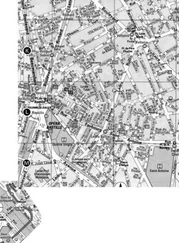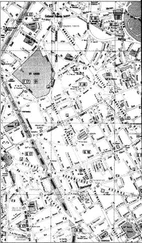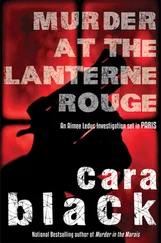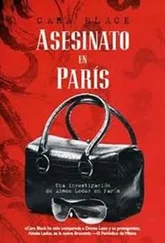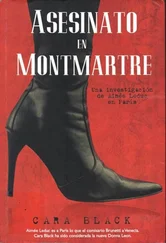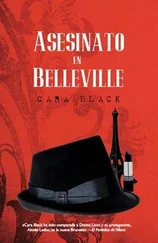Aimée continued up the wide stairs. Her goal, the top flat, encompassed the entire floor. Here she had to find answers.
She heard low voices, music, a radio? She knocked several times. No answer. Then knocked again until she heard footsteps.
“ J’arrive ,” said a voice.
The door creaked open. The middle-aged woman who opened the dark green door wore a flannel nightshirt and Nordic wool slipper socks, and was sipping something steaming and smelling of cinnamon.
“Forgive me,” Aimée said. “I don’t mean to disturb you—”
“No salespeople allowed in the building, I’m sorry,” the woman interrupted in a nasal congested voice. “They shouldn’t have let you in.”
Aimée flashed her identification card. “I’m a detective, investigating a homicide in the building opposite you.”
“Homicide?” The woman pushed her glasses onto her forehead and rubbed her eyes, which were a striking aqua blue. “I don’t know what you’re talking about. You’ll need to excuse me, I’m sick.”
This woman must have been at home last night. Aimée couldn’t let her shut the door in her face. “Sorry to insist, but this will take just a moment. Probably you’ve answered these questions already,” she said. She wanted to see the view from this woman’s apartment. And there should be geraniums near a window facing the courtyard.
“What do you mean? No one’s spoken to me,” the woman told her. “What homicide?”
“Haven’t the police questioned you yet?”
The woman shook her head.
Aimée wondered why not.
“Let me see your identification again, Mademoiselle.”
Aimée handed over her PI license with its less than flattering photo: squinty eyes and pursed mouth.
“The pharmacy’s late.” The woman glanced at an old clock on the wall and handed the license back. “They were supposed to deliver my medicine by now.”
“A man was murdered last night,” Aimée said, wiping her wet boots on the mat. “I need to ask you some questions. May I come in?”
“It’s nothing to do with me,” the woman said, about to close the door.
“Let’s talk inside,” Aimée said.
“ Non. I can’t deal with questions,” the woman replied.
“Just while you wait for the pharmacy delivery.”
“ Non ,” the woman said, alarmed. “I’m sick.”
“But if we talk now, Madame—”
“I don’t go out.” The woman smothered a cough. “I won’t go to the police station.”
An agoraphobic? Aimée heard something in her voice, was it the trace of an accent?
“Madame, you don’t need to go to the Commissariat,” Aimée said. “I’m a private investigator, we’ll talk right here. And I must see the view from your window.”
The woman pulled out a wad of tissues from her pocket, reconsidered, and blew her nose. “All right, but just five minutes.”
Aimée stepped inside the pale yellow hallway, eighteenth century by the look of it. A green plastic shopping cart was parked on the black-and-white diamond-patterned floor by a pair of worn snow boots. She expected a place dripping with antique chandeliers, but instead Art Deco sconces and Surrealist collages lined the walls. Several Man Ray silver-gelatin-print photographs hung over a gleaming Ruhlmann secrétaire . One appeared to be an original of Violon d’Ingres , the famous Surrealist image of Kiki, Man Ray’s lover, in a turban, musical notes drawn on her bare back down her spine.
“Such a lovely apartment,” Aimée said, aiming to get this woman to talk. “You’ve lived here a long time, Madame?”
“Zoe Tardou,” the woman admitted, showing Aimée to a room furnished with sleek blond-wood Art Deco pieces and mod-erne thirties-style rugs. Black blankets hung at the floor-to-ceiling windows. Aimée’s heart sank. How could Zoe Tardou have noticed movement on the roof with these blankets blocking the windows?
“Tardou, like the Surrealist?” Aimée asked to keep the conversation going.
“My stepfather,” Zoe Tardou said, her mouth tightening.
No wonder she could afford this expensive apartment covering the entire floor. But from the way Zoe Tardou’s mouth had compressed, Aimée figured she hadn’t gotten along with her stepfather.
Zoe Tardou switched on the light, illuminating silver-framed black-and-white photos. Beachfront family scenes from the sixties and celebrity snapshots covered the baby grand piano. A late-model television sat in front of a damask-covered sofa. But an unlived-in feeling permeated the large room.
“You’re an artist, too?”
“My mother was a Dadaist poet and did figure modeling,” Zoe said.
One of the Surrealist muses?
Zoe Tardou took a deep swallow of her steaming drink. She beckoned Aimée to a small nook behind the sofa. “Medieval scholarship’s my field.”
Here a blond joined-wood desk piled with notebooks and books angled out from the wall. Well used. Above the desk, mounted on the wall, hung an ancient crucifix and framed manuscript pages bearing ornate gold lettering and ancient black script. Definitely at odds with the Deco-period furnishings.
The cold air in the darkened apartment began to chill Aimée. Didn’t this woman ever turn on the heat?
“Were your windows open last night?”
“Always,” she said. “The human body needs fresh air at night.”
For a woman into health, she looked miserable.
“So, you would have heard the party below despite the storm?”
”I don’t know the neighbors. I keep to myself.”
“Mind if I take a look?” Aimée walked to the window and quickly pulled the blanket aside. The older woman’s eyes blinked at the sudden light.
Directly across the courtyard lay the scaffolding under the roof of the corniced apartment where she’d discovered Jacques’s body. The skylight on the roof level opposite glittered in the weak sunbeams from a sudden break in the clouds. She saw the path she’d taken with Sebastian, aghast at the steepness of the roof they’d climbed.
“Do you keep these blankets up at night?”
Aimée didn’t remember seeing them.
“ Non. ” Madame Tardou blew her nose. “Look, if that’s all you need to know I’d appreciate if you left.”
But the woman might have noticed something after all, even if she didn’t realize it.
“If you’ll permit me to clarify a few things. Think back to eleven o’clock last night. Did you hear anything unusual on the roof, see any lights over there?” Aimée pointed at the apartment windows almost directly opposite.
“I did hear snippets of conversation,” Madame Tardou replied. “At first I thought they were speaking Italian.”
Italian? Excited, Aimée took a step closer. The woman reeked of eucalyptus oil.
“Do you speak Italian?”
“ Non . And it must have been some drama on the télé . I was drifting in and out of sleep with this terrible cold.”
“What made you think it was Italian?”
“We used to go there on holiday,” she replied.
“What did they say?”
“Maybe it wasn’t Italian.”
“Please, it’s important. Can you place the language?”
Zoe Tardou shook her head. “I know they talked about the stars and planets.”
Had Zoe Tardou been dreaming after all?
“How could you tell?”
“Sirius, Orion, and Neptune, those names I could understand.”
“Male or female voices?”
“Male voices. Two, at least. I remember, in the village people talked about the constellations,” Zoe Tardou said, her gaze somewhere else, speaking as if to herself. “It didn’t seem so odd.” She shrugged. “Almost familiar. At least where I came from.”
Читать дальше

